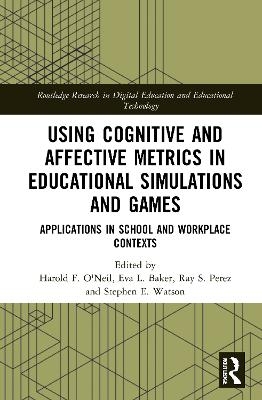
Using Cognitive and Affective Metrics in Educational Simulations and Games
Routledge (Verlag)
978-0-367-24382-1 (ISBN)
The volume responds to the increasing use of computer-based simulations and games across academic and professional sectors by bringing together contributions from different research communities, including K-12 and postsecondary education, medical, and military contexts. Drawing on empirical results, the chapter authors focus on the design and assessment of educational simulations and games. They describe how quantitative and qualitative metrics can be used effectively to evaluate and tailor instructional resources to the cognitive and affective needs of the individual learner. In doing so, the volume enhances understanding of how games and simulations can intersect with the science of learning to improve educational outcomes.
Given its rigorous and multidisciplinary approach, this book will prove an indispensable resource for researchers and scholars in the fields of educational assessment and evaluation, educational technology, military psychology, and educational psychology.
Harold F. O’Neil is Professor of Educational Psychology and Technology in the Rossier School of Education, University of Southern California, US. Eva L. Baker is a Distinguished Professor at UCLA and founding Director of CRESST, US. Ray S. Perez is Program Officer of the Cognitive Science of Learning Program, Office of Naval Research, US. Stephen E. Watson is Chief Inventor, Affinity Associates LLC, US.
Editors’ Preface; Part I: Cognitive Metrics; 1. Video Games and Higher Cognition; 2. Teaching and Assessing Young Gamers’ Engineering Problem Solving Using Interactive Simulation Games; 3. Adaptation Evidence From a Digital Physics Game; Part II: Affective Metrics; 4. Metrics of Motivation in Simulations or Game Environments; 5. Metrics for Engagement in Games and Simulations for Learning; 6. Measuring and Increasing Self-Efficacy in a Game; 7. Measuring and Increasing Interest in a Game; 8. Metrics for Assessment in the Navy Life Game
| Erscheinungsdatum | 19.05.2021 |
|---|---|
| Reihe/Serie | Routledge Research in Digital Education and Educational Technology |
| Zusatzinfo | 26 Tables, black and white; 2 Line drawings, black and white; 2 Halftones, black and white; 4 Illustrations, black and white |
| Verlagsort | London |
| Sprache | englisch |
| Maße | 152 x 229 mm |
| Gewicht | 544 g |
| Themenwelt | Geisteswissenschaften ► Psychologie ► Pädagogische Psychologie |
| Sozialwissenschaften ► Pädagogik | |
| ISBN-10 | 0-367-24382-2 / 0367243822 |
| ISBN-13 | 978-0-367-24382-1 / 9780367243821 |
| Zustand | Neuware |
| Haben Sie eine Frage zum Produkt? |
aus dem Bereich


